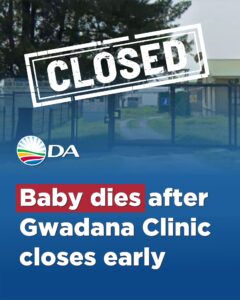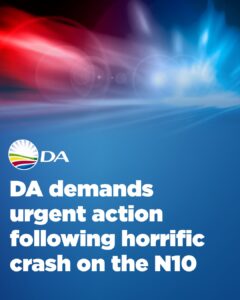Healthcare delivery in the Eastern Cape is being severely compromised due to the critical shortage of essential medical equipment, known as Non-Negotiable Vitals (NNVs). These items include life-saving tools such as Automated External Defibrillators (AEDs), pharyngeal masks, and endotracheal tubes, among others. These are called “vital” because they are crucial to saving lives, yet many clinics and community healthcare centres in the province either have insufficient stock or none at all.
I have written to the MEC for Health, Ntandokazi Capa, urging her to ring-fence funds to ensure that these critical, life-saving items are available at all healthcare facilities as a matter of urgency. The supply of NNVs must be protected to prevent further deterioration of healthcare services. Non-negotiable vitals are exactly that—non-negotiable.
In the Alfred Nzo district, only 23% of clinics and primary healthcare facilities are compliant with the Office of Health Standards Compliance (OHSC), primarily due to infrastructural failures and a dire shortage of NNVs. Furthermore, only 39% of these clinics have achieved Ideal Clinic status—a basic benchmark for quality healthcare services. The shortage of NNVs is one of the key reasons for this. It’s worth noting that Alfred Nzo was one of the sites of the National Health Insurance (NHI) pilot project, the outcomes of which were never revealed. Now, we understand why.
The department’s ongoing cash flow problems, exacerbated by medico-legal claims, have further depleted resources, leading to a decline in the quality of care. This shortage of essential equipment will only lead to more litigation against the department. While over 80% of the health budget is allocated to Compensation of Employees (CoE), there is virtually no funding left for the life-saving equipment needed to deliver quality patient care.
The Eastern Cape Department of Health is at a crossroads. Difficult decisions must be made if we are to avoid further collapse. It’s time to cut unnecessary administrative costs, halt commuted overtime, settle existing debts, and prioritise filling critical clinical posts.
Above all, ensuring that all healthcare facilities are adequately equipped with NNVs must become the department’s number one priority. Only then can we prevent further litigation and begin to rebuild the quality of healthcare services that our residents deserve.









